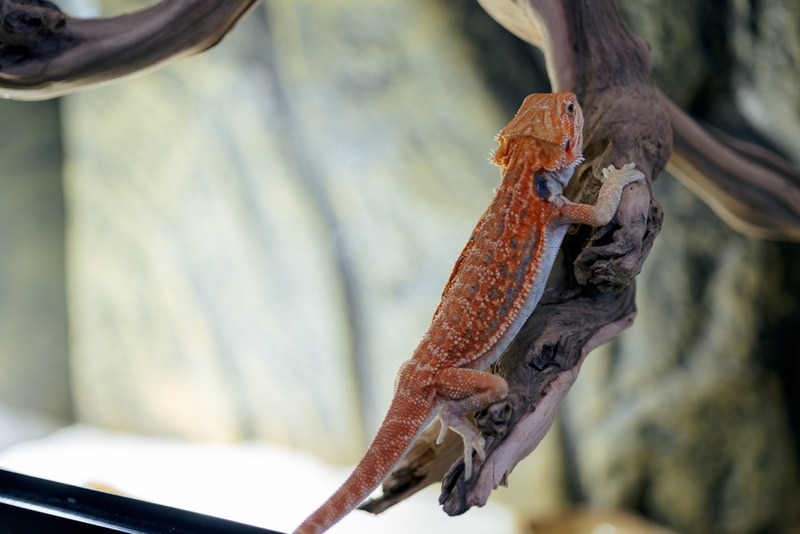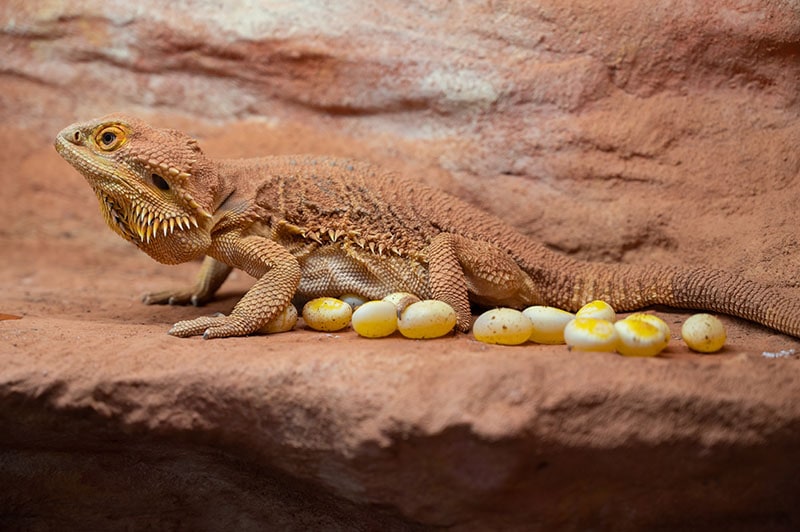Why Does My Bearded Dragon Scratch in the Corner? 5 Vet-Reviewed Reasons & Tips
Updated on

Ever caught your bearded dragon scratching away in the corner of their tank? You might’ve thought, “What’s gotten into you?” Well, it’s not always them being mischievous or trying to redecorate. This behavior can, at times, be a sign of other things.

Possible Reasons Why your Bearded Dragon is Scratching in the Corner
1. Signs of Boredom
We might not think of reptiles as creatures prone to boredom, but bearded dragons are curious beings. If they’re constantly scratching, it’s possibly a hint that they might be feeling cooped up. Imagine staying in the same room day in and day out. Even with the best decor, you’d probably feel restless too. Toys, climbing structures, or even something as simple as a new branch can rekindle their interest and reduce their scratching endeavors.

2. The Urge to Roam
Bearded dragons, despite their relatively laid-back demeanor, are explorers at heart. Scratching, especially towards the top or corners of the enclosure, might be their way of saying, “I want to see what’s out there!” Regular, supervised outings can help satisfy this innate curiosity. But always ensure the surroundings are safe and that your dragon isn’t exposed to any potential hazards.
3. Health and Wellness Checks
Though boredom and the itch to explore are common reasons, persistent scratching can sometimes point to health concerns. Maybe there’s something in the tank causing discomfort, or perhaps their nails are too long. It’s always a good move to do regular check-ups, look over their habitat, and consult a vet if things seem a bit off.

4. Shedding
At times, bearded dragons will scratch against surfaces, such as the wall of their enclosure, or a rock, when they’re shedding their skin. Your pet might be trying to dislodge a piece of their old skin by scratching in the corner of their enclosure if they can’t find another suitable surface to scratch against.
5. Preparing to Lay Eggs
Please note that this will only happen in a sexually mature female that has undergone brumation and has been paired with a sexually mature male who has also undergone brumation. At Pet Keen, we do not encourage breeding your pets, as this process is rather difficult, expensive, and may lead to complications. This section is for informative purposes only.
There’s another interesting reason for a bearded dragon’s corner-scratching routine: motherhood. If your bearded dragon is female and has been introduced to a male in the recent past, she might be getting ready to lay eggs. In the wild, these soon-to-be dragon moms dig and bury their eggs, and this behavior translates even in captivity. Scratching and digging in the corner of the tank might be her instinctive way of preparing a safe spot for her eggs.
However, it is worth noting that not all females dig elaborately deep nests to lay their eggs, and some might just deposit them on a tank floor indiscriminately. Bearded dragons have no maternal instincts and don’t look after their eggs or young.


Conclusion
Bearded dragons are more than just cool-looking creatures in a tank. They’ve got personalities, desires, and yes, even moments of restlessness. When they start scratching in the corner, it’s their way of communicating. Whether it’s a bit of wanderlust or sheer boredom, it’s on us to decode and address those needs.
However, always keep a balanced perspective. While it’s essential to provide them with engagement and exploration opportunities, safety should never be compromised. And remember, when their behavior seems puzzling or overly persistent, it never hurts to turn to experts for insights. After all, ensuring our scaly pals are content is what it’s all about.
Featured Image Credit: Svitlyk, Shutterstock











